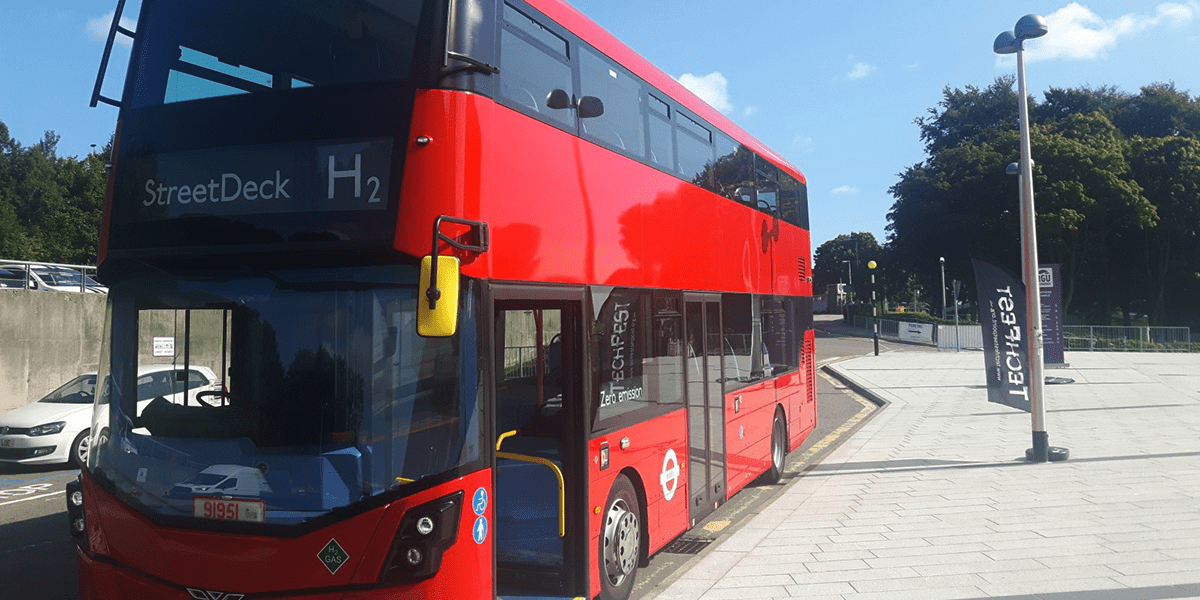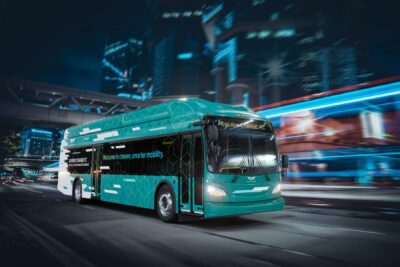Scotland awaits 15 fuel cell double-decker buses in spring
The 15 fuel cell buses that were ordered from Wrightbus by the Scottish city of Aberdeen last year will be delivered with some delay in spring 2020. After an initial test phase, the hydrogen fuel cell buses will go into regular service this summer.
++ Please find updates below. ++
The emissions-free double-decker buses will be put into regular service along the most popular service routes of public transport provider First Aberdeen – mainly on lines 19 and X27.
Aberdeen City Council actually ordered the 15 fuel cell buses in summer last year. The buses were originally supposed to be delivered in 2019, but then the manufacturer Wrightbus filed for bankruptcy. Luckily, the Bamford Bus Company took over the business operations and assets of Wrightbus and has been able to fulfil the order.
The buses are Wrightbus Streetdeck FCEV with FCmove-HD fuel cell systems made by Canadian company Ballard Power Systems. The fuel cell bus was developed as part of the EU-funded JIVE project. In June of last year, Everfuel, Wrightbus, Ballard Power Systems, Hexagon Composites, Nel Hydrogen and Ryse Hydrogen joined forces to form the H2Bus consortium to provide 1,000 FC buses in European cities and the necessary infrastructure at competitive prices.
The financing for the purchase of Aberdeen’s hydrogen double-decker buses comes from an £8.3million project (9.5 million euros) funded by Aberdeen City Council, the Scottish Government, and the European Union (FCH JU), with an investment of around £500,000 per vehicle.
Aberdeen City Council Co-Leader Councillor Jenny Laing said: “Aberdeen is at the forefront of developing green technologies and our continued innovative commitment to hydrogen truly puts us on the global map. The new buses come with even better technology helping to tackle air pollution in the city and further makes Aberdeen an entrepreneurial and technological leader by pushing boundaries for hydrogen. We are really proud to be the world’s first city with hydrogen double-deckers, and we look forward to seeing them on the city’s roads.”
The Aberdeen City Council is heralding the new buses as the “world-first hydrogen double-deckers.” Although Writghtbus was the first company to make fuel cell double-decker buses, they were soon followed by ADL. As hydrogen technologies become more familiar, public transport providers are picking up on the advantages of large fuel cell vehicles. Just last month in the USA, Orange County unveiled a new bus fleet of 10 fuel cell-electric buses in Santa Ana. In January less than a couple of months ago, the city of Auxerre commissioned the French manufacturer Safra to deliver five fuel cell buses to the French city by the end of 2020.
Common to hydrogen fuel cell vehicles, fuel cell buses can boast longer ranges compared to their battery-electric counterparts as well as shorter refuelling times. Fuelling infrastructure for the buses has built up since the UK’s first hydrogen production, and bus refuelling station was opened in Aberdeen in 2015, as part of a £19million green transport demonstration project. The project was led by the Aberdeen City Council with the goal of testing and trialling the economic and environmental benefits of hydrogen transport technologies.
Scotland’s Energy Minister, Paul Wheelhouse, said: “I expect we will begin to see many more ‘greener and cleaner’ transport solutions like this begin to emerge. We are currently undertaking a wide-ranging project to assess the potential for hydrogen and hydrogen fuel cells for use in transport and heating across Scotland. Hydrogen could well play an important role in the energy transition that’s required to meet our 2045 net-zero emissions target.”
Update 31 August 2020: The Scottish city of Aberdeen wants to purchase ten more such buses in addition to the 15 fuel cell buses already ordered from Wrightbus as above, thus increasing the number of hydrogen buses in the city to 25. The background is that an additional 1 million pounds of funding has now become available in the framework of the EU project JIVE, which is used to co-finance the hydrogen buses.
intelligenttransport.com, sustainable-bus.com, aberdeencity.gov.uk





1 Comment